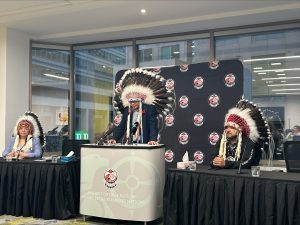
FOR IMMEDIATE RELEASE
November 3, 2025
‘The price for growth shouldn’t be people’s lives’: Indigenous leaders tell Ottawa
OTTAWA – As Prime Minister Mark Carney’s government looks to pass its first budget focused on growing the Canadian economy, Indigenous leaders are reminding Ottawa that growth should never come at the cost of people’s lives.
The Mikisew Cree First Nation, along with the Assembly of First Nations and the Treaty 8 First Nations of Alberta, call on the federal government to reject the proposed treat-and-release of toxic oil tailings into the Athabasca River system.
“Treat-and-release” refers to the treatment of toxic oil sands tailings in order to release them back into the environment. The Athabasca River system, which members of the Mikisew Cree First Nation and neighbouring communities rely on for essential needs like drinking water and food, is surrounded by large tailings “ponds” containing 1.4 trillion litres of toxic tailings.
Following a report highlighting the urgent need for oil sands operators to be able to release treated water as part of the reclamation of oilsands mining sites, the government of Alberta is exploring it as an option. Treat-and-release as accepted by Alberta is neither safe nor reasonable, nor is it supported by science.
“Industry need isn’t an excuse to dump toxic oil sands waste in an essential waterway,” said Mikisew Cree First Nation Chief Billy-Joe Tuccaro. “By choosing treat-and-release, these governments are choosing to make companies richer over keeping my people alive.”
Mikisew Cree First Nation has experienced firsthand the negative health impacts of toxic oil waste leaking into the nearby water systems they rely on for critical necessities like drinking water and food. The community is also currently going through a cancer crisis, with higher than average rates of cancer and rare cancers – almost every member of Mikisew Cree First Nation has been touched by cancer in some way.
As this Liberal government considers which “nation-building” projects it will fast-track under Bill C-5, Mikisew Cree First Nation is calling on the government of Canada to have real Nation-to-Nation consultation before continuing with oil sands development, including the Pathways Plus carbon capture and pipeline project.
“If they want to act with urgency to build these major projects, they should act with urgency to meet with us and address the major health concerns of my people,” said Tuccaro.
The Mikisew Cree First Nation invites Prime Minister Mark Carney to visit Fort Chipewyan to meet with leaders and see how toxic waste from oil sands is impacting the lives and livelihoods of several First Nation communities.
“Today, I stand with the Mikisew Cree First Nation and Treaty 8 First Nations in Alberta in calling on governments to respect First Nations rights and Treaties and ensure the health and well-being of First Nations people. The situation at Mikisew Cree First Nation demands immediate action and attention. Canada needs to reach out to Chief Tuccaro now and work with the First Nation to address the current crisis and necessary next steps.”
– AFN National Chief Cindy Woodhouse Nepinak
“Treaty 8 stands with Mikisew Cree First Nation in demanding that both the federal and provincial governments act in good faith. Our Nations have carried the burden of industrial development long enough, while governments debate solutions that ignore the human cost. Protecting our lands and waters is not negotiable. Canada and Alberta must move beyond words and work with us through true Nation-to-Nation dialogue to protect the health and well-being of our people. Every policy and project must begin with respect for life, for the water, and for the generations yet to come. We must work together to come up with solutions that protect the environment and the health of our Nations.”
– Treaty 8 First Nations of Alberta Grand Chief Trevor Mercredi
ABOUT MIKISEW CREE FIRST NATION
The Mikisew Cree First Nation lives on the Peace-Athabasca Delta and what is now known as Wood Buffalo National Park in northeastern Alberta, where our traditional lands overlap with a large portion of Athabasca oil sands deposits. The lives of our members are linked to the land and a close understanding of tradition, history, and a natural way of life.
FAST FACTS
- The oil sands tailing ponds in northern Alberta are some of the largest in the world. As of 2023, nearly 1.4 trillion litres of oilsands tailings were stored in the province.
- Currently, there are no provincial or federal regulations that permit the release of oilsands tailings.
- The government of Canada is also working on its own regulations for oilsands tailings and, in this, are discussing possible alternatives with the Crown-Indigenous Working Group. Mikisew Cree First Nation is participating in the group, as well as speaking bilaterally with the federal government, on this policy.
- Only 0.1 per cent of the oil sands lands have been reclaimed. Many projects were approved based on “adaptative management” – that is, industry and Alberta regulators would figure out reclamation at a later date.
- The Fort Chipewyan Health Study, a community-led health study from Athabasca Chipewyan First Nation, the Mikisew Cree First Nation and the Fort Chipewyan Métis Nation is currently underway, studying the impact of the oil sands on the health of community members. The study is being funded by the Government of Canada.
Media contact:
